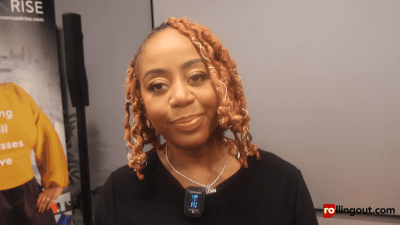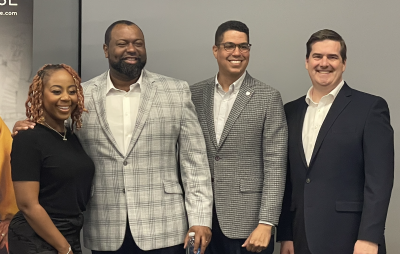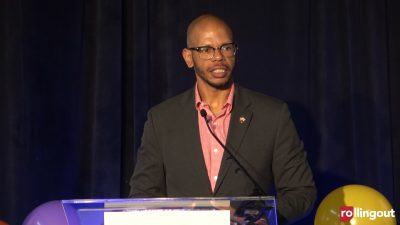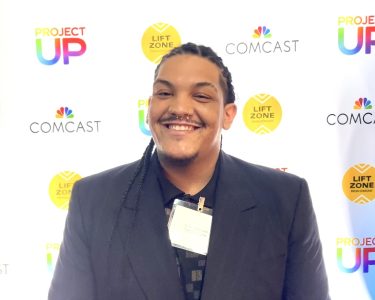
Bret Perkins has taken his sons around the world – without ever leaving the house.
Perkins, the vice president for external and governmental affairs for Comcast Corp., is continuing his intergenerational love of formal and informal education that was instilled in him by his parents. Using the information superhighway – the Worldwide Web – Perkins has made education fun, engrossing and beneficial for his two sons.
“My kids will learn they have to be global. And so, [it’s important] … to give them that because of where you are. I can’t hop on a train and be in three countries in a day,” said Perkins. “But online I can expose them to all sorts of different readings and maps. I was in Egypt and taught my sons about what I saw there through the Internet — ‘here’s the Pyramid of Giza.’ It’s awesome.”
Through the Internet, Perkins has shown his kids how they can use the powerful, intercontinental medium for much more than video games, sports and cartoons. In fact, even through sports, which his kids love, Perkins was able to show them how they can procure opportunities and slide through open doors that they would not be able to if they didn’t know how to navigate the electronic highway.
“My oldest loves baseball. He’s really into baseball and he’s playing and we go online often. We spend more time learning about opportunities and free clinics that are available that he wouldn’t have known about without the Internet. I never played lacrosse, but right now the best thing is lacrosse because they have the highest number of scholarships for the kids that are coming through,” he said, adding that if your goal is to get a free education, then your chances greatly improve if you gain proficiency in lacrosse. “It’s not played in a lot of places. It’s not played in high school. They get a free lacrosse clinic for eight weeks. But we found it online. … If you’re not online the likelihood that you will find this is minuscule.” –terry shropshire
Perkins, works with national advocacy agencies that shape public policy, communication and technology.
He is currently working with Comcast on Internet Essentials, a campaign designed to expose more minority and low-income residents to the internet through special program offerings. Perkins sat down with rolling out in New York to discuss his style of leadership, the value education has had on his career, and the importance of mentorship.
What is your style of Leadership?
I’ve been fortunate I’ve worked for some really great people throughout my career. And the first thing I noticed is that leadership matters. The first thing is to understand what’s important to you and making you a part of that. If I just tell you where I’m going for a certain period of time but it’s not in your interest, at some point in time you run out of energy to continue. The people that I’ve worked for … had taken an interest in my development as a professional. It’s one thing to say, ‘If we’re gonna go to some other place, three or four years down the road, you’re going to need these sets of skills and to get these sets of skills here’s what you need to do. I’ve been fortunate [to have] always worked for people who took the long view of me, that [what] I am today is not what I’ll be in a year from now and they allowed me to take stretch assignments that enabled me to become more. In turn I’ve tried to do that with the people that work for me. We have a job to do, I want smart dedicated people. In this industry we’re lucky that we’re doing so much. You get a chance to do that. There is always more to do than what we have arms and legs to do. So if you’re willing to pick things up, I guarantee you will grow and have chance to be something different next year than where you are now.
What has education meant to your career and personal growth?
I try to think of myself as a life-long learner. Everyday reading, part of its my job and part of it is intellectual curiosity. Technology makes it possible. I grew up around maps… solar systems, the planets, the world and the U.S. So I always [had] a sense of other stuff and a curiosity for it. I’m a bit of an amateur history person. I love 18th century history and the founding of this country. I just downloaded a series of web course from Yale on the revolution. … I have [an] interest in Middle East and I have a bunch of apps that give every day or every week what’s happening in the middle east. … because I have access to this technology and think about the world my children are growing up in, it’s a global society. I was just in London, and if you grow up in Europe, it’s your playground and your work and that’s what you know. My kids will learn they have to be global.
How important is it to have a mentor and be a mentor?
The biggest impact of my adult professional career was meeting my mentor. I always told people that I didn’t know how to be a mentor until I met my mentor. My mentor is now retired. Her name is Delores. She ran the hospital at the University of Pennsylvania, the first African American to run such an operation. She is incredibly smart, sharp and intuitive. Her style of mentorship was one part professional and another part emotional as a person. She essentially adopted me. In each stage of my career she’s been a guide to both help inside of work and outside of work. She knows my wife and she’s now like a mother to both of us … She has her family, her career and she’s done it all. She’s been successful, raised two kids, professional, in an industry was not integrated professionally and I get benefit from learning from it. I know the value of it. I know what I owe. I spend a lot of time working with Temple students from working class families who don’t have a lot of advantage. I can provide a road map for them and how they start their careers off.











